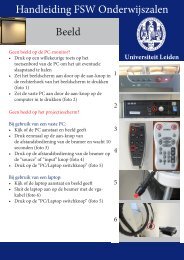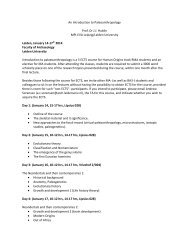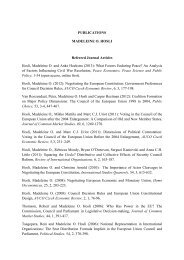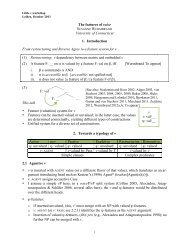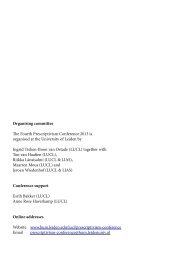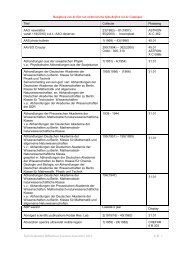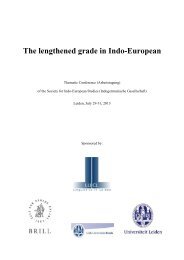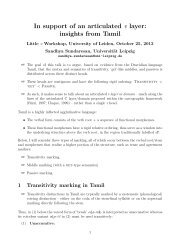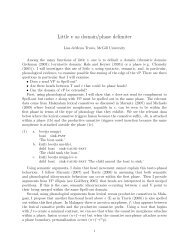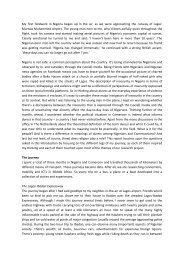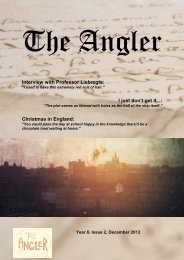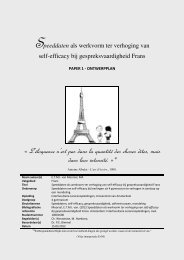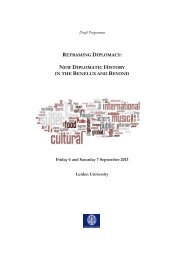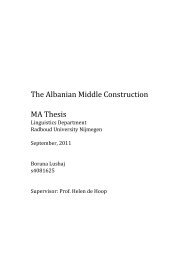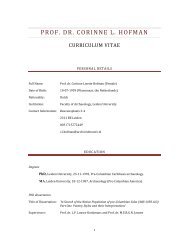Institute for History Annual Report 2010 - O - Universiteit Leiden
Institute for History Annual Report 2010 - O - Universiteit Leiden
Institute for History Annual Report 2010 - O - Universiteit Leiden
Create successful ePaper yourself
Turn your PDF publications into a flip-book with our unique Google optimized e-Paper software.
European Expansion and<br />
Globalisation<br />
Description<br />
One of the central themes of the history of the last<br />
five hundred years is the phenomenon currently<br />
referred to as the process of globalisation. In this<br />
process, a central role has been played in the past<br />
by the phenomenon of Western European expansion,<br />
the various ways in which other continents<br />
responded to this and the developments resulting<br />
from this expansion. Globalisation means the<br />
emergence of a world economy, worldwide migration<br />
flows, the birth of nation states and many<br />
other phenomena. Central to this history are the<br />
early activities of the chartered trading companies,<br />
the rise of colonial empires and enterprises,<br />
resistance movements, wars of independence and<br />
decolonization, all of which have left us their<br />
archives whose unique character stems from the<br />
interaction between expanding and contracting<br />
Europe and the rest of the world. It is there<strong>for</strong>e no<br />
coincidence that this history has its own historiography<br />
and its own journals. Owing to the rich<br />
economic, anthropological and political data they<br />
contain, ‘colonial’ archives are also of inestimable<br />
value in the study of the autochthonous history of<br />
non-Western areas, as demonstrated by the<br />
success of the TANAP and ENCOMPASS projects<br />
which the history department of <strong>Leiden</strong> University<br />
is presently carrying out in close cooperation with<br />
<strong>Institute</strong> <strong>for</strong> <strong>History</strong><br />
78<br />
academic institutions in Asia and South Africa.<br />
The scholarly and societal importance of studying<br />
the history of European expansion and global<br />
interaction cannot be overemphasized.<br />
The history department plays an important role in<br />
the study of global history. As early as 1902,<br />
<strong>Leiden</strong> University offered lectures on ‘colonial<br />
history’, but from the 1950s onwards turned<br />
towards ‘global history’. This concept should not<br />
be understood in the sense of the comparative<br />
method, but as an approach which focuses on the<br />
study of emerging global connections in history.<br />
As the American historian Patrick Manning put it:<br />
‘Connection conveys the character of world<br />
historical analysis better than any other term. It<br />
acknowledges locality and uniqueness, yet also invokes<br />
broad patterns’. (Navigating World <strong>History</strong>:<br />
Historians Create a Global Past 2003).<br />
In this context, the history department of <strong>Leiden</strong><br />
University centres on the study of global interaction<br />
processes making use of the wide range of<br />
primary sources available in the broad environment<br />
of the university. <strong>Leiden</strong> possesses in this<br />
respect a unique infrastructure <strong>for</strong> the use of both<br />
primary and secondary source materials. Not only<br />
are the rich archives of the VOC, the WIC and the<br />
<strong>for</strong>mer Ministry of Colonies in the National<br />
Archives in The Hague located at a fifteen minutes<br />
distance by public rail system from <strong>Leiden</strong>, but the<br />
<strong>Leiden</strong> University Library also houses the entire<br />
library collection of the <strong>for</strong>mer Ministry of<br />
Colonies, while the KITLV and Africa <strong>Institute</strong><br />
have world famous collections on Caribbean,<br />
Southeast Asian and African history. In addition,



